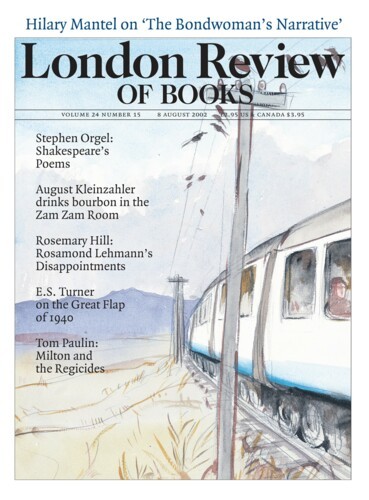One of the ads on London Underground for the Science Museum’s Grossology exhibition features a little girl’s freckly and bespectacled face gawping amazed into a fish-eye lens. ‘How much poo is that?’ she is asking. Underneath, the small print informs any curious passengers dawdling on the platform quite how many tonnes of manure the horses that once pulled London’s taxis used to produce.
London’s last horse-drawn hackney carriage was retired from active service in 1947, 308 years after the Corporation of Coachmen first received a licence allowing them to compete with sedan chairs. According to Poles Apart: The Public Sedans of Bygone London, a pamphlet by Geoffrey Wilson (Connor and Butler, £5.95), ‘the first public hire chairs in Britain appeared in London in 1634, after Charles I had granted a warrant to Sir Saunders Duncombe, a gentleman-pensioner of the King, giving him the sole right to build covered chairs and operate them for hire in London and Westminster for 14 years.’ Fifteen years later, it was in a sedan chair that the King was transported from the courtroom to the scaffold. Did thoughts of Duncombe’s warrant, however fleetingly, cross his mind?
Sir Purbeck Temple, testifying against the regicides in 1660, alleged that ‘the people cried out: “What, do you carry the King in a common Cedan, as they carry such as have the Plague?”’ John Evelyn, too, had a low opinion of the contraption, ‘it being held a conveyance for voluptuous persons and women of pleasure to their leu’d Rendivozes incognito’. The Covent Garden Morning Frolick (1747), an engraving by Louis Boitard that’s reproduced in Poles Apart, would seem to bear out Evelyn’s analysis, except for the ‘incognito’ bit: a knackered Betty Careless (‘a notorious bagnio owner’) is being carried home by a pair of cross but long-suffering chairmen, while Captain Montague (‘one of her lovers’) cavorts indecorously on the sedan’s roof. Dr Johnson would have felt for those having to put up with the extra (and destabilising) burden. In a letter in the Rambler, ‘purporting’, as Wilson says, ‘to come from a chairman’, he wrote:
It is common for men of the most unwieldy corpulence to crowd themselves into a chair, and demand to be carried for a shilling as far as an airy young lady whom we scarcely feel upon our poles. Surely we ought to be paid like all other mortals in proportion to our labour. Engines should be fixed in proper places to weigh chairs as they weigh wagons; and those whom ease and plenty have made unable to carry themselves, should give part of their superfluities to those who carry them.
Similar thoughts, less elegantly expressed, occurred to me recently, at the sight of three sturdy tourists enjoying a trip through Soho on a bicycle rickshaw. A greater imaginative leap is required to conceive what it might be like from the point of view of the chair itself. Wilson describes a bizarre ‘mid-Georgian semi-autobiographical novel’ called The Sedan (1757). The ‘adventures are told in a mixture of the first and third person. On one occasion the chair is required to carry hot food, to its chagrin.’ The originality of Bo Fowler’s Scepticism Inc. (1998), which is narrated by a supermarket trolley, pales. ‘On another occasion the fare escapes without paying, by . . . ordering the men to wait for him while he calls at a house, whence he decamps by the back door. Such a kind of bilking must have been a real occasional occupational hazard.’ And still is: I was told a similar story (different vocabulary) by a minicab driver a few weeks ago, as we sped up the Walworth Road.
It works the other way round, too, of course: César de Saussure, writing home to Switzerland from London in the 18th century, advised that ‘sedan chairs are numbered, and there is an office where you can go and make your complaint if cheated by your bearers.’ These days the place to go is the Public Carriage Office, 15 Penton St, N1. And if you don’t know how to get there, you can always take a cab.
Send Letters To:
The Editor
London Review of Books,
28 Little Russell Street
London, WC1A 2HN
letters@lrb.co.uk
Please include name, address, and a telephone number.

